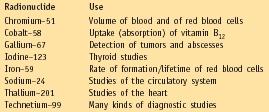Nuclear medicine
Nuclear medicine is a special field of medicine in which radioactive materials are used to conduct medical research and to diagnose (detect) and treat medical disorders. The radioactive materials used are generally called radionuclides, meaning a form of an element that is radioactive.
Diagnosis
Radionuclides are powerful tools for diagnosing medical disorders for three reasons. First, many chemical elements tend to concentrate in one part of the body or another. As an example, nearly all of the iodine that humans consume in their diets goes to the thyroid gland. There it is used to produce hormones that control the rate at which the body functions.
Second, the radioactive form of an element behaves biologically in exactly the same way that a nonradioactive form of the element behaves. When a person ingests (takes into the body) the element iodine, for example, it makes no difference whether the iodine occurs in a radioactive or nonradioactive form. In either case, it tends to concentrate in the thyroid gland.
Third, any radioactive material spontaneously decays, breaking down into some other form with the emission of radiation. That radiation can be detected by simple, well-known means. When radioactive iodine enters the body, for example, its progress through the body can be followed with a Geiger counter or some other detection instrument. Such instruments pick up the radiation given off by the radionuclide and make a sound, cause a light to flash, or record the radiation in some other way.
If a physician suspects that a patient may have a disease of the thyroid gland, that patient may be given a solution to drink that contains radioactive iodine. The radioactive iodine passes through the body and into the thyroid gland. Its presence in the gland can be detected by means of a special device. The physician knows what the behavior of a normal thyroid gland is from previous studies; the behavior of this particular patient's thyroid gland can then be compared to that of a normal gland. The test therefore allows the physician to determine whether the patient's thyroid is functioning normally.
Treatment
Radionuclides can also be used to treat medical disorders because of the radiation they emit. Radiation has a tendency to kill cells. Under many circumstances, that tendency can be a dangerous side effect: anyone exposed to high levels of radiation may become ill and can even die. But the cell-killing potential of radiation also has its advantages. A major difference between cancer cells and normal cells, for example, is that the former grow much more rapidly than the latter. For this reason, radiation can be used to destroy the cells responsible for a patient's cancer.
A radionuclide frequently used for this purpose is cobalt-60. It can be used as follows. A patient with cancer lies on a bed surrounded by a large machine that contains a sample of cobalt-60. The machine is then rotated in such a way around the patient's body that the radiation released by the sample is focused directly on the cancer. That radiation kills cancer cells and, to a lesser extent, some healthy cells too. If the treatment is successful, the cancer may be destroyed, producing only modest harm to the patient's healthy cells. That "modest harm" may occur in the form of nausea, vomiting, loss of hair, and other symptoms of radiation sickness that accompany radiation treatment.
Words to Know
Diagnosis: Any attempt to identify a disease or other medical disorder.
Isotopes: Two or more forms of an element that have the same chemical properties but that differ in mass because of differences in the number of neutrons in their nuclei.
Radioactivity: The property possessed by some elements of spontaneously emitting energy in the form of particles or waves by disintegration of their atomic nuclei.
Radioactive decay: The process by which an isotope breaks down to form a different isotope, with the release of radiation.
Radioactive isotope: A form of an element that gives off radiation and changes into another isotope.
Radionuclide: A radioactive isotope.
Radioactive isotopes can be used in other ways for the treatment of medical disorders. For example, suppose that a patient has a tumor on his or her thyroid. One way of treating that tumor might be to give the patient a dose of radioactive iodine. In this case, the purpose of the iodine is not to diagnose a disorder, but to treat it. When the iodine travels to the thyroid, the radiation it gives off may attack the tumor cells present there, killing those cells and thereby destroying the patient's tumor.
Some Diagnostic Radionuclides Used in Medicine

| Radionuclide | Use |
| Chromium–51 | Volume of blood and of red blood cells |
| Cobalt–58 | Uptake (absorption) of vitamin B 12 |
| Gallium–67 | Detection of tumors and abscesses |
| Iodine–123 | Thyroid studies |
| Iron–59 | Rate of formation/lifetime of red blood cells |
| Sodium–24 | Studies of the circulatory system |
| Thallium–201 | Studies of the heart |
| Technetium–99 | Many kinds of diagnostic studies |
[ See also Isotope ]
Please also email your answer to 006705@wmac.com.au as well as gleeluva@hotmail.com
Thanks it would be great if I could hear back from a proffesional.